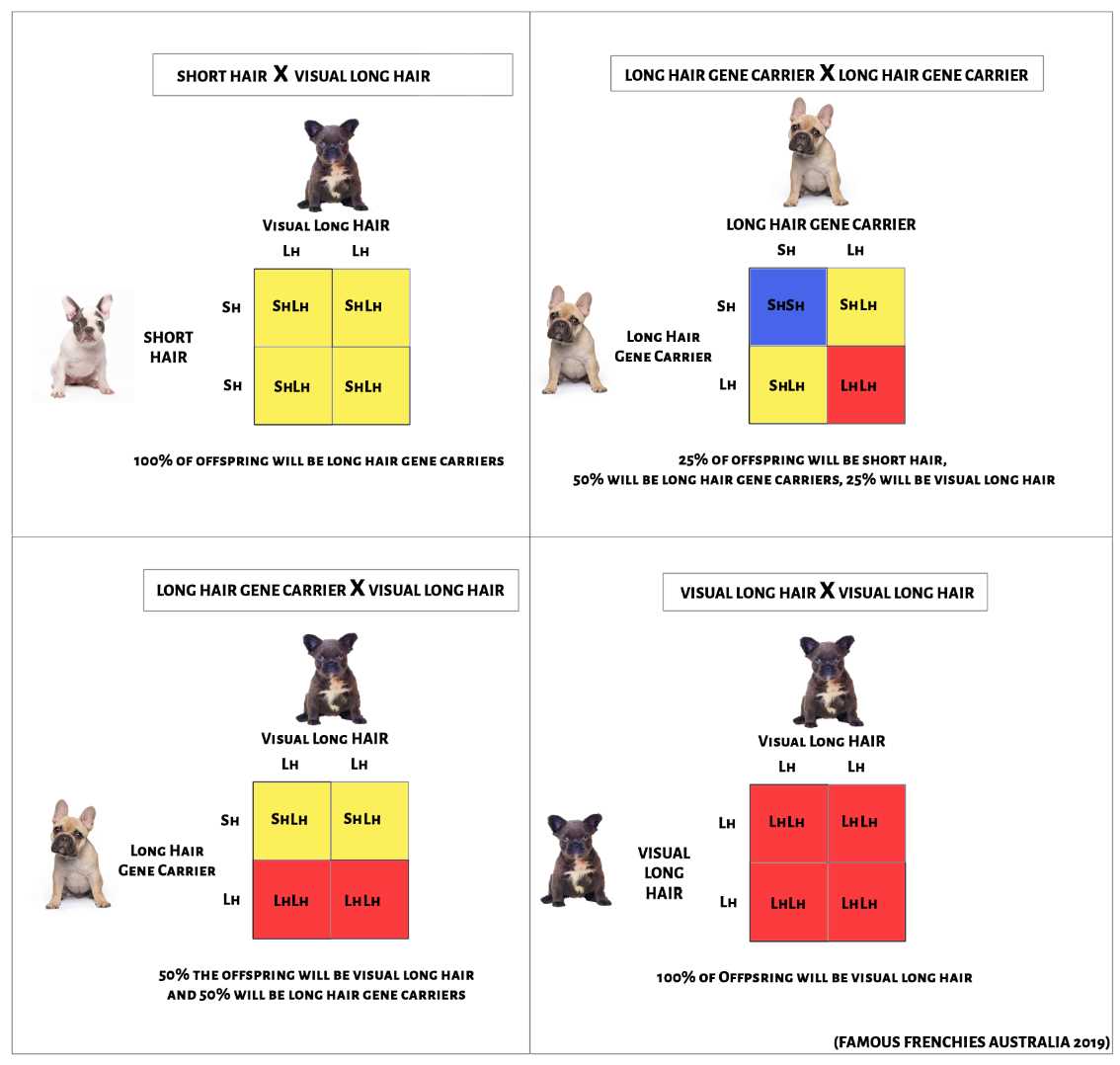
The French Bulldog, with its distinctive bat-like ears and adorable wrinkled face, has captured the hearts of dog lovers around the world. But have you ever wondered what lies beneath that cute exterior? The answer lies in the genetic makeup of this beloved breed.
Thanks to advancements in DNA testing, scientists have been able to unlock the secrets hidden within the French Bulldog’s genes. This groundbreaking research has provided valuable insights into the breed’s origins, health risks, and even its physical characteristics.
One of the key findings from the French Bulldog DNA chart is the breed’s close genetic relationship to the English Bulldog. It turns out that these two breeds share a common ancestor, which explains their similar physical traits and temperament. However, the French Bulldog also has unique genetic markers that set it apart from its English cousin.
Another fascinating discovery is the presence of certain genetic mutations that contribute to the French Bulldog’s distinct appearance. These mutations are responsible for the breed’s short, stocky build, as well as its characteristic bat ears. Understanding these genetic variations not only helps us appreciate the breed’s unique charm but also sheds light on potential health issues that may arise as a result.
By studying the French Bulldog DNA chart, researchers have also identified specific genetic markers associated with certain health conditions that are common in the breed. This knowledge has enabled breeders and veterinarians to develop better screening tests and preventive measures to ensure the health and well-being of these beloved dogs.
Understanding the Origins of French Bulldogs
The French Bulldog is a beloved breed known for its unique appearance and friendly personality. To truly understand this breed, it is important to delve into its origins and trace its history back to its roots.
Origins in England
Contrary to its name, the French Bulldog actually originated in England. In the 19th century, lace workers from Nottingham, England, migrated to France and brought their small bulldogs with them. These bulldogs were bred with local French dogs, resulting in the creation of the French Bulldog as we know it today.
The French Bulldog quickly gained popularity in France, particularly among the Parisian elite. The breed’s distinctive appearance, with its bat-like ears and compact size, made it a fashionable choice among the city’s fashionable residents.
Importance of the Bulldog Breed
The French Bulldog’s origins can be traced back to the larger English Bulldog breed. The English Bulldog was known for its strength and tenacity, and it was often used in the sport of bull-baiting. However, as bull-baiting was banned in England in the mid-19th century, the English Bulldog’s popularity declined.
To preserve the breed, breeders began crossing English Bulldogs with smaller, more agile breeds. This resulted in the creation of the French Bulldog, which retained the Bulldog’s distinctive appearance but in a smaller, more manageable size.
Characteristics and Traits
The French Bulldog is known for its friendly and affectionate nature. They are loyal companions and make excellent family pets. Despite their small size, French Bulldogs have a sturdy build and are known for their muscular bodies and strong bone structure.
One of the most distinctive features of the French Bulldog is its bat-like ears. These ears are a result of selective breeding and give the breed its unique appearance. French Bulldogs also have a short, smooth coat that comes in a variety of colors, including brindle, fawn, and white.
French Bulldogs are generally low-maintenance dogs and do not require excessive exercise. However, they do enjoy short walks and playtime. They are also prone to certain health issues, such as breathing difficulties and skin allergies, so regular veterinary check-ups are important.
The Genetic Makeup of French Bulldogs
French Bulldogs have a unique genetic makeup that sets them apart from other dog breeds. Understanding their genetic composition is crucial for breeders and owners alike. Let’s delve into the fascinating world of French Bulldog DNA.
1. Ancestral Origins
The genetic makeup of French Bulldogs can be traced back to their ancestral roots. They are descendants of the ancient Molossian dogs, which were large and powerful canines used in warfare. Over time, these dogs were bred down in size to create the French Bulldog we know and love today.
2. Coat Colors and Patterns
One of the most intriguing aspects of French Bulldog DNA is their coat colors and patterns. These dogs can come in a variety of shades, including brindle, fawn, cream, and pied. The genes responsible for coat color and pattern have been identified through genetic testing, allowing breeders to predict the potential colors of future litters.
3. Health Concerns
Genetic makeup also plays a significant role in the health of French Bulldogs. Due to their unique anatomy, these dogs are prone to certain health issues, such as brachycephalic syndrome, hip dysplasia, and allergies. Understanding the genetic predispositions to these conditions can help breeders make informed decisions to improve the overall health of the breed.
4. Temperament Traits
French Bulldogs are known for their friendly and affectionate nature. Their genetic makeup contributes to these desirable temperament traits. Through genetic testing, researchers have identified genes associated with sociability, trainability, and other behavioral characteristics. This information can be valuable for breeders looking to maintain and enhance these positive traits in future generations.
5. Genetic Diversity
Genetic diversity is crucial for the long-term health and survival of any breed. In recent years, French Bulldogs have faced challenges due to a limited gene pool and excessive inbreeding. Genetic testing allows breeders to assess the genetic diversity within their breeding lines and make informed decisions to prevent the accumulation of harmful genetic mutations.
6. Future Research
The field of French Bulldog DNA research is constantly evolving. Scientists and breeders are working together to uncover more about the genetic makeup of these dogs. Ongoing research aims to identify additional genes responsible for coat color, health conditions, and temperament traits. This knowledge can help breeders make informed decisions and improve the overall health and well-being of French Bulldogs.
Genetic Testing for French Bulldogs
Genetic testing has become an invaluable tool for breeders and owners of French Bulldogs. By understanding the genetic makeup of these beloved dogs, we can better understand their health, temperament, and physical traits. Genetic testing allows us to identify potential health issues and take proactive measures to ensure the well-being of our furry friends.
One of the main benefits of genetic testing is the ability to screen for inherited diseases. French Bulldogs are prone to certain genetic conditions, such as brachycephalic syndrome, hip dysplasia, and allergies. Through DNA testing, we can identify the presence of these diseases and take appropriate steps to manage or prevent them.
Genetic testing also helps in determining the ancestry of French Bulldogs. By analyzing their DNA, we can trace their lineage and understand their origins. This information can be useful in breeding programs to ensure the preservation of desirable traits and to avoid potential health issues associated with inbreeding.
Furthermore, genetic testing can provide insights into the physical characteristics of French Bulldogs. It can reveal information about their coat color, pattern, and texture. This knowledge can be valuable for breeders who want to produce specific color variations or for owners who are curious about the genetic factors behind their dog’s appearance.
It is important to note that genetic testing is not a guarantee of a dog’s health or behavior. It provides valuable information, but other factors, such as environment and lifestyle, also play a significant role. However, by utilizing genetic testing, we can make more informed decisions regarding breeding, health management, and overall care for French Bulldogs.
The Future of French Bulldog DNA Research

In recent years, there has been a growing interest in understanding the genetic makeup of French Bulldogs. This interest has led to significant advancements in DNA research for this beloved breed. As technology continues to evolve, the future of French Bulldog DNA research looks promising.
One area of focus for future research is the identification of genetic markers that are associated with specific health conditions in French Bulldogs. By identifying these markers, breeders and veterinarians can better understand the potential health risks for individual dogs and take proactive measures to prevent or manage these conditions.
Another area of interest is the exploration of the genetic diversity within the French Bulldog population. This research can help identify potential genetic bottlenecks and inbreeding issues that may be contributing to certain health conditions. By understanding the genetic diversity of the breed, breeders can make informed decisions to promote healthier breeding practices and reduce the risk of inherited diseases.
Advancements in DNA sequencing technology are also expected to play a significant role in the future of French Bulldog DNA research. As sequencing becomes faster and more affordable, researchers will have the ability to analyze larger datasets and uncover more detailed information about the genetic makeup of French Bulldogs. This will enable them to make more accurate predictions about health risks and develop targeted breeding strategies.
Furthermore, the integration of DNA research with other fields, such as veterinary medicine and nutrition, holds great potential for the future of French Bulldog health. By combining genetic information with clinical data, researchers can gain a deeper understanding of how genetics influence various health conditions and develop personalized treatment plans for affected dogs.
Harnessing the Power of French Bulldog DNA
As our understanding of genetics continues to advance, researchers are discovering new ways to harness the power of French Bulldog DNA. By studying the genetic makeup of these beloved dogs, scientists are able to gain valuable insights into their health, behavior, and physical characteristics.
One area where French Bulldog DNA research has shown great promise is in the field of health. By analyzing the DNA of French Bulldogs, researchers have been able to identify genetic markers for various health conditions that are common in the breed. This knowledge allows breeders to make informed decisions when selecting breeding pairs, helping to reduce the prevalence of these conditions in future generations.
In addition to health, French Bulldog DNA research has also shed light on the breed’s behavior. By studying the genes associated with certain behaviors, researchers have been able to gain a better understanding of why French Bulldogs exhibit certain traits. This knowledge can be used to develop training techniques that are tailored to the breed’s unique characteristics, improving the overall well-being and happiness of French Bulldogs.
Furthermore, French Bulldog DNA research has provided insights into the physical characteristics of the breed. By examining the genes responsible for coat color, size, and structure, scientists have been able to better understand the genetic factors that contribute to the breed’s distinct appearance. This knowledge can be used to maintain and enhance the breed standard, ensuring that French Bulldogs retain their iconic look for generations to come.
The Importance of Genetic Testing

Genetic testing plays a crucial role in harnessing the power of French Bulldog DNA. By conducting genetic tests, breeders and owners can gain valuable information about their dogs’ genetic health and potential risks for certain conditions. This information can then be used to make informed decisions about breeding, healthcare, and lifestyle choices for French Bulldogs.
Genetic testing can also help identify carriers of certain genetic mutations, even if they do not exhibit any symptoms of the associated condition. This allows breeders to make informed decisions about which dogs to include in their breeding programs, helping to reduce the risk of passing on genetic disorders to future generations.
The Future of French Bulldog DNA Research

The future of French Bulldog DNA research is bright. As technology continues to advance, researchers will have access to even more powerful tools for studying the genetic makeup of French Bulldogs. This will enable them to uncover even more insights into the breed’s health, behavior, and physical characteristics.
With this knowledge, breeders will be able to make even more informed decisions about breeding, ultimately leading to healthier and happier French Bulldogs. Additionally, the information gained from French Bulldog DNA research can also benefit other breeds, as many genetic traits and conditions are shared across different breeds.
Conclusion
The power of French Bulldog DNA cannot be overstated. By harnessing the insights gained from genetic research, breeders and owners can make informed decisions to improve the health, behavior, and physical characteristics of French Bulldogs. Through genetic testing and ongoing research, the future looks bright for this beloved breed.

Tyler Newsom, a canine enthusiast, is passionate about bulldogs and their coat care. With years of experience and dedication, he shares his expertise to help bulldog owners maintain their beloved pets’ fur health and vitality through practical tips and advice.
